Our content is reader supported, which means when you buy from links you click on, we may earn a commission.
How Jordan Carroll Makes 6-Figures/Year with a Proven Strategy for Finding Remote Work
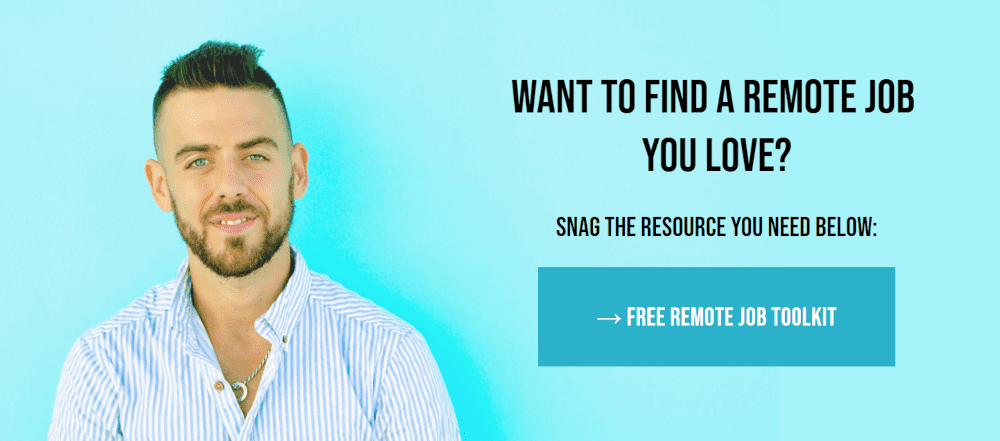
- Who: Jordan Carroll
- Website: theremotejobcoach.com
- Course Topic: Remote Careers
- Interesting Stats: Used LinkedIn native video to gain 11K followers.
Who are you and what course have you created?
I’m Jordan Carroll and The Remote Job Club is my subscription-based course platform.
What market does your online course serve?
Remote career transitions (whether a first-time remote worker, or long-time remote worker) require commitment, which is why I serve serious, committed, high-performing individuals who are ready to find more freedom and flexibility in life.
There are various different segments of people, and each client has their own motivations for desiring remote work. I help my clients understand those motivations and develop a personalized strategy to find a great remote job using the tools and resources in my course.
What’s the biggest benefit of taking your course?
Developing a proven strategy for finding remote work not only now, but anytime in the future. The benefit of that is confidence, and for many people who’ve struggled with their search, this is invaluable. Here are a few other pieces of ‘transformation’ my course helps facilitate:
- Go From Frustrated and Desperate to Confident in Yourself.
- Go From Overwhelmed and Stuck to 100% Clarity on Your Next Steps.
- Go From Discouraged and Doubtful to Fully Accountable.
- Go From Overwhelmed to *Actually* Excited About Your Job Search.
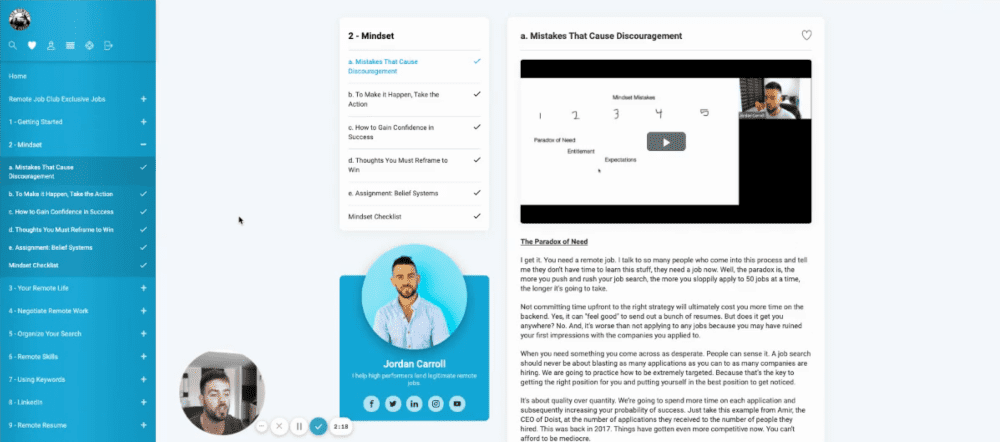
How did you get into the market?
I’ve worked remotely, consistently, upwards of 7 years for:
- A global Fortune 50 tech company with over 400k employees (IBM)
- A fully distributed, remote-first travel company with 150 employees (Remote Year)
- Multiple other startups with a range of 2-50 employees as well as my own businesses
These experiences gave me a unique perspective, and I realized:
There’s a learning curve to both finding remote jobs as well as becoming an efficient, high-performing remote worker. These aren’t subjects taught in school.
So, I set out to educate others.
My alter ego #TheRemoteJobCoach is a result of helping others learn a proven system that enabled me to get hired to work remotely as a high performer, without the “traditional application process.”
Why did you decide to create an online course in the first place?
In the early days of my business, I was always directly involved when coaching clients (1-1). I wanted to build an asset that could become a 1 to many solution for people, thus giving more people access, making more impact, and reducing my need to always be on calls.
I saw many people build courses successfully and I had confidence that I could do it too. In addition, it helps as a coach to have a course. When I’m coaching now, I’m focusing on very strategic questions since my clients do the self-paced work outside of our sessions to absorb the info. It makes our time spent together much more valuable.
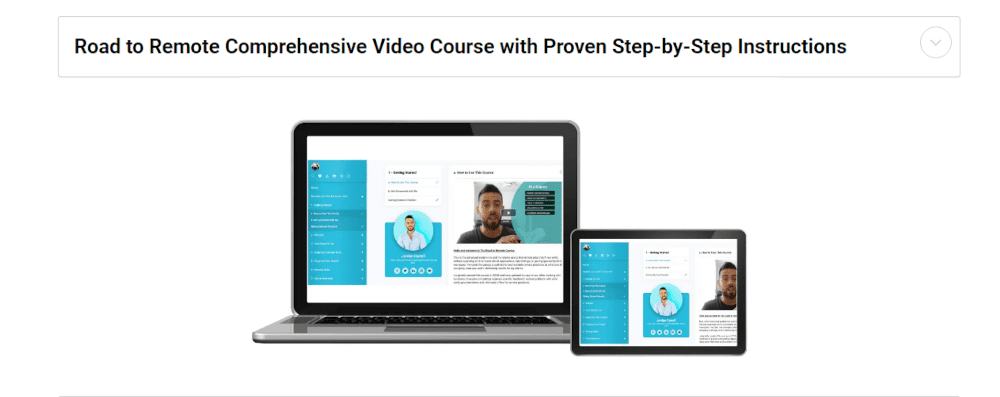
Did you have any moments of doubt before you created/launched it?
In the days leading up to the launch, I was nervous. I worried that people wouldn’t benefit from the course, in spite of my best efforts to make it useful. Then I launched the course and quickly became even more nervous. In the beginning, the course didn’t sell the way I thought it would. It felt like no one cared.
To improve the course, I would give free access to select clients and ask for feedback, get testimonials. My clients had plenty of constructive feedback and it was sometimes hard to hear. Some clients didn’t get great results because they didn’t put in the work, but I felt responsible for them.
I continued to push through.
I learned to take all the feedback less personally and spent hundreds of hours improving my course using the feedback I was given. - Jordan Carroll Click To TweetThe course started performing and selling better after that, especially as a combined package with my coaching.
I learned to let go of feeling responsible for transforming people’s lives. Now I focus on being the best mentor I can be, while acknowledging that my clients are ultimately responsible for their own transformational change.
What’s your online course like?
The Remote Job Club course has every type of media format. There are videos in most lessons (80+ at this point), with comprehensive text versions as well. The videos change from PowerPoint to talking head to whiteboard to Prezi Video. I mix it up so that people with various learning styles can find something they like. There are resources and assignments in Google Docs, Sheet, and PDF format as well. There are checklists throughout so they know where they’re at and I also add new remote jobs from my network to the course platform every week.
How long did it take you to create your course?
It took hundreds of hours to design. At first, I built my course in a silo, teaching strategies and tactics that worked for me when I landed remote jobs. After sharing the course, I spent hundreds of hours iterating the course based on feedback.
I had to consider and teach other strategies and tactics that worked for different groups of people and in a general sense. The work on my course is never really finished, I routinely update and refine my course to make it as valuable as possible for a wide group of professionals who want a remote job.
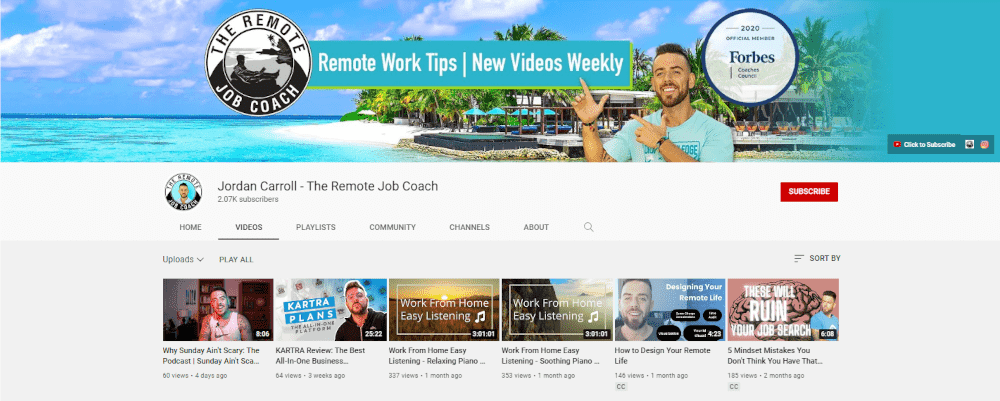
Tell us a little about the process of launching your course and getting your first sale(s).
Launching my course was intimidating, knowing I had to deliver. It is an act of vulnerability. Getting my first sale was exciting but scary because I wondered if my course would help my customer. Then my first client started getting interviews and soon was hired for a remote job. It was then that I felt relieved, and the result reaffirmed my confidence in the value of my course. Soon, my customers started sending me screenshots of emails they were getting from recruiters and job offers. It was then that I felt less pressure and knew it worked.
Do you have a lead magnet?
My free resources can be found here.
Every day in the background people sign up for these, which expands my email list and warm traffic. I have sequences that go out to these people and it helps to have these things on autopilot so I’m constantly putting offers in the face of those who might be interested and ready to sign up. I recently started offering a trial of my paid Starter plan to those who sign up for the free version of my course. Still learning more about how this converts as of now.
What’s the traffic strategy that works best for you?
I routinely produce social media content on Linkedin and Youtube. The organic reach of these platforms is always attracting new followers and connections. My content almost always includes CTA’s that provide my audience with valuable information that they can access by subscribing to my email marketing. In time, many of my followers become interested in my course and services after they watch my videos and read my material.
Another invaluable traffic strategy has been pursuing partnerships and collaborations with influencers, podcasters, clubhouses, and publications.
Every time I collaborate with an influencer in my industry, I’m exposing my brand to a new audience that shares my interests and values. My brand benefited greatly from these collaborations. - Jordan Carroll Click To TweetI do get a healthy amount of referrals too.
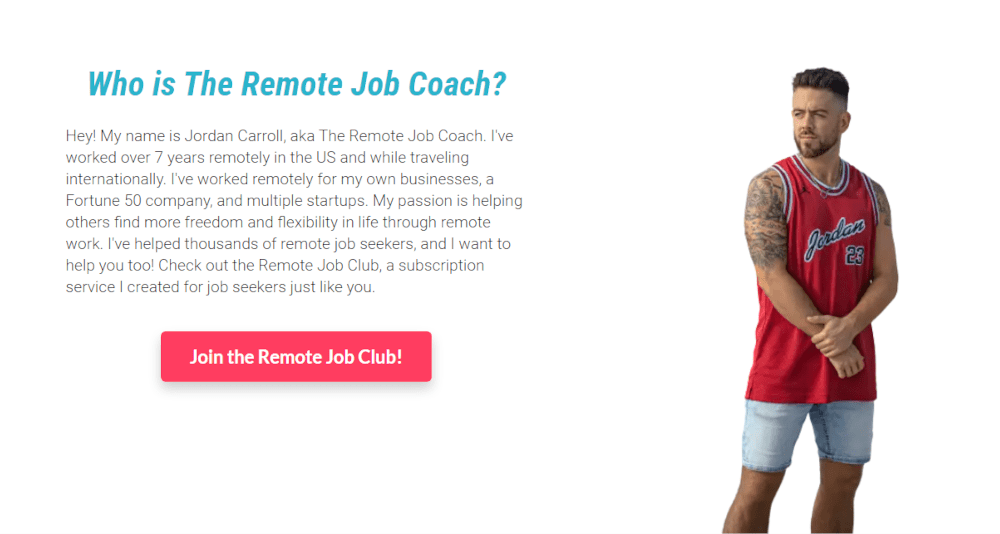
What online course platform are you using?
My course is currently built in Kartra. It’s an all-in-one membership and business platform and I love it.
Do you like it?
Absolutely!! Kartra is an all-in-one platform. Combining web design features with a CRM, page builder, helpdesk, calendar, marketing funnels, and email list features … etc.
There is a learning curve to using this platform. After working with a Kartra coach I realized I was barely touching the potential of the platform but was also making it way more complicated than I had to.
Are there any features you wish it had?
Kartra has a calendar feature but it’s not as robust as I’d like. I still use OnceHub for scheduling. Still, Kartra has almost everything else I could want.
What made you decide to use your chosen platform over others?
I upgraded to Kartra because it combines the functions of many tools I used to use and puts it all in one place. Kartra replaced five apps I was actively using. Now I use Kartra for marketing automation, webpage building, membership portals, shopping carts, online forms, split testing, link tracking, appointment scheduling, campaign analytics, and more.
What other tools do you use to run your online course business?
My website is hosted on Squarespace. I make strong use of Linkedin, Youtube, Instagram, and Facebook groups to promote my brand. I also use Typeform (although Kartra recently announced surveys!)
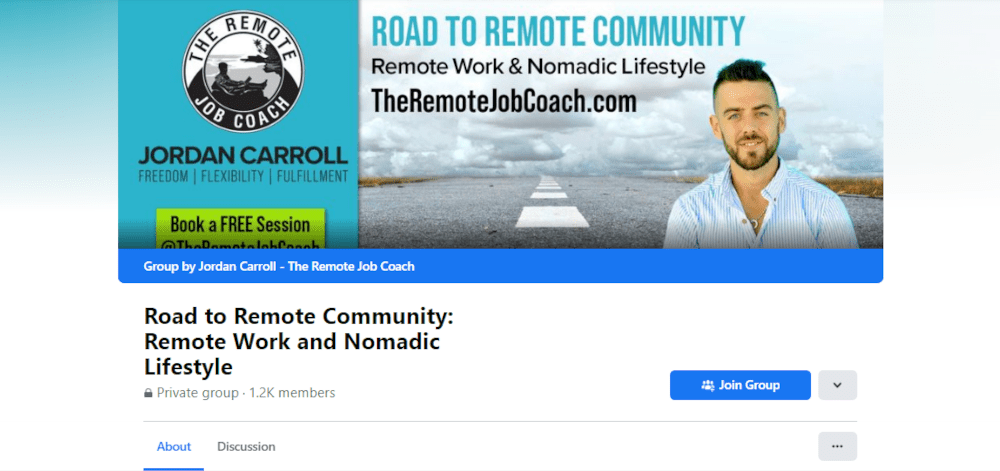
Do you have any big mistakes you’ve made along the way that you’d be willing to share?
Hiring without knowing the process of the tasks that I was assigning. If you don’t know how to do something yourself, you can’t expect someone to do it in the exact way you want. Early on, I wasted money making this mistake.
I overinvested in some programs, tools, and other things that made my business more complicated. I got caught up in ‘playing business’ rather than having one. A good business should be lean, especially during the validation stage, and then add complexity later on.
Please share some idea of revenue.
My business and courses generate between $8000 to $13,000 every month.
Please tell us a little about what the money you’ve earned from your course has done for you.
For now, most of my earnings go right back into my business. I invest my earnings into other projects, assistants, and my upcoming book. I’m developing my brand and a range of income sources, growing them to the point where they generate self-sustaining income.
There are ways in which I treat myself with the money I earn. Financially, my course gave me the ability to be anywhere I wanted. I’ve used that ability to explore over 15 countries around the world. My course income also allows me to invest in my personal training, including a basketball coach. With the money I earn, I have been able to let go of some financial anxieties.
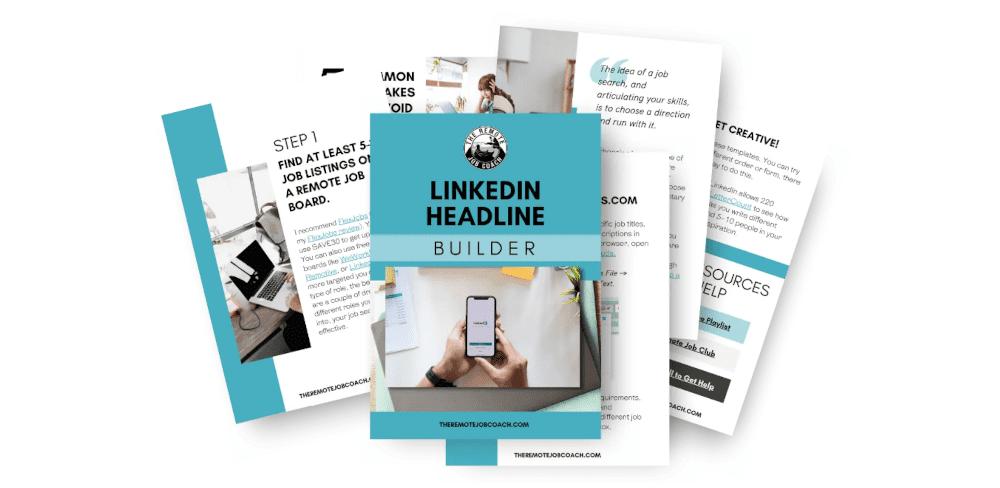
In addition to revenue are there any numbers you would like to share?
When I was initially growing my LinkedIn, I used native video when it was a new feature. It helped me grow my following to 11k. Whenever a social media platform launches or releases new features, they tend to enable great organic reach. Over time, the organic reach will dwindle.
My advice for rapid growth is to keep a lookout for new social media platforms and feature releases. Those are opportunities to get massive organic reach. - Jordan Carroll Click To TweetAlso, consistency! It’s boring, but if you post and iterate based on what’s working, even in the face of obstacles, you’ll win. It’s a long-term game.
What has creating your course done for you personally?
Once you create something that people find valuable, you can step back and appreciate what you have done. The recognition I have received from my customers and my industry has given me more confidence. I care less about what people think of me. Most of all, it is very satisfying to know that I helped people change their lives. Ultimately, that’s what making a course is all about.
Do you have a story of a transformation from any of your clients?
I have many testimonials, both filmed and written.
What advice do you have for people just starting out?
Pay attention to the responses you get as you network, develop your brand, and find your voice on social media. If people start looking to you for advice and ask you the same questions, you have an opportunity to build a course around those topics.